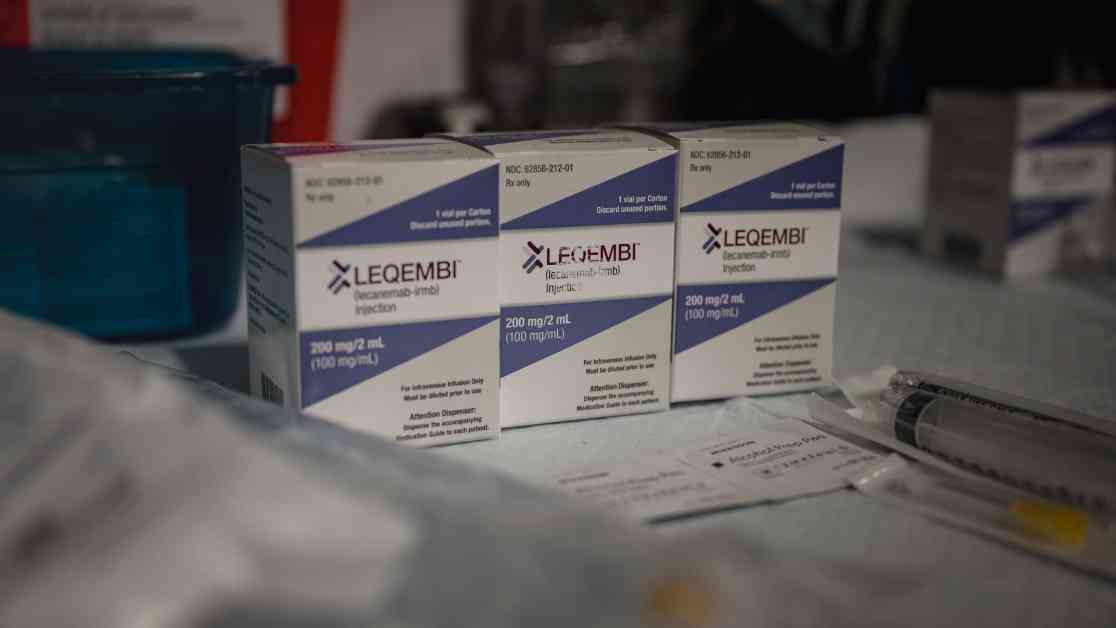Promising Alzheimer’s Drug Leqembi Offers Hope for Patients’ Treatment Journey
Leqembi, an Alzheimer’s drug developed by Biogen and Eisai, has recently emerged as a beacon of hope for patients battling the mind-damaging effects of the disease. While it is not a cure for Alzheimer’s, Leqembi has shown promise in providing patients with more time to live their daily lives independently and with a sense of normalcy. One such patient benefiting from the treatment is Missie Meeks, an English professor from Ellisville, Mississippi, who was diagnosed with early-stage Alzheimer’s at the age of 50. With the regulatory approval of Leqembi in the U.S. in July 2023, Meeks became eligible for the treatment, which she began receiving through infusions in September of the same year.
Meeks shared her experience with CNBC, stating, “I still have fumbles. I’m not perfect by any means. But I can function every day pretty much normally. I can drive, I can go to the doctor, I can go out to eat. It’s extending my time of a normal life.” Leqembi, a monoclonal antibody, has been found to moderately slow the decline in memory and cognitive function in patients in the early stages of Alzheimer’s. While only a small percentage of the nearly 7 million Alzheimer’s patients in the U.S. are in these early phases, Leqembi’s potential impact on their quality of life is significant.
Despite the benefits of Leqembi, the drug does come with risks, including brain swelling and bleeding. Some experts have expressed concerns about the long-term clinical benefits of the drug, citing the need for more data on its efficacy. Dr. Julio Rojas, a behavioral neurologist at the University of California, San Francisco Health, acknowledged the challenges associated with a new drug like Leqembi, stating, “We’re still figuring out how to use the drug, how to monitor it, when to stop it, how to decide if it’s working or not.”
The process of receiving Leqembi treatment can be complex and arduous for patients and their caregivers. From securing appointments with neurologists to navigating insurance coverage and meeting diagnostic test requirements, patients often face numerous hurdles in accessing the treatment. Some hospitals and clinics are not equipped to handle the influx of patients seeking Leqembi, leading to delays in treatment initiation. Additionally, some healthcare providers are hesitant to prescribe the drug due to concerns about its risks and the lack of long-term data on its efficacy.
Despite these challenges, the number of patients receiving Leqembi is on the rise, with sales of the drug increasing significantly in the first half of the year. Biogen’s earnings reports indicate a growing demand for the treatment, with approximately 5,000 people taking the drug at the time of the most recent update. The gradual rollout of Leqembi has been attributed to the difficulties in diagnosing patients with mild cognitive impairment or early dementia, the initial stages of Alzheimer’s.
Tracey Collins, a patient from Portland, Maine, shared her journey of receiving a diagnosis for early Alzheimer’s after experiencing symptoms of cognitive decline. Collins’ road to diagnosis was prolonged due to her age and other factors that initially masked her symptoms. She eventually received a diagnosis in 2022 after undergoing a spinal fluid test with a neurologist in Boston. Accessing a neurologist can be challenging for many patients, as there is a shortage of neurologists in the U.S., leading to long wait times for appointments.
Once a patient is diagnosed with early Alzheimer’s, they must undergo a series of tests to determine their eligibility for Leqembi treatment. These tests include PET scans to detect amyloid accumulation in the brain, MRI scans to rule out other brain diseases, and genetic testing for the APOE4 gene variant. A panel of experts evaluates the test results to determine if a patient qualifies for Leqembi, with approximately 60% of patients meeting the criteria for treatment at institutions like the Mayo Clinic.
The process of receiving Leqembi treatment also involves regular monitoring for potential side effects, such as brain swelling and bleeding. Patients must undergo biweekly infusions of the drug, which can be administered at infusion clinics that may be located far from their homes. Some patients face challenges in accessing these clinics due to transportation issues or limited availability of facilities offering the treatment. Eisai and Biogen are exploring options for more convenient forms of Leqembi, such as a maintenance dose that stretches infusion intervals to once per month or a subcutaneous injection that can be administered at home or in a medical facility.
Patients receiving Leqembi treatment have reported positive experiences during their infusions, likening the process to a therapeutic session where they can connect with others facing similar challenges. Despite the risk of side effects like ARIA, patients and caregivers remain hopeful that the drug will provide them with more time to live independently and engage in their daily activities. The potential long-term benefits of Leqembi are still being studied, with experts emphasizing the need for continued monitoring and evaluation of patient outcomes.
In conclusion, Leqembi represents a significant advancement in the treatment of Alzheimer’s disease, offering hope to patients and their families who are grappling with the impact of this devastating condition. While challenges remain in accessing and administering the drug, ongoing research and innovation in the field of Alzheimer’s treatment hold promise for improving the lives of those affected by the disease. As more patients receive Leqembi and share their experiences, the medical community will continue to learn and adapt to maximize the benefits of this groundbreaking therapy.






















